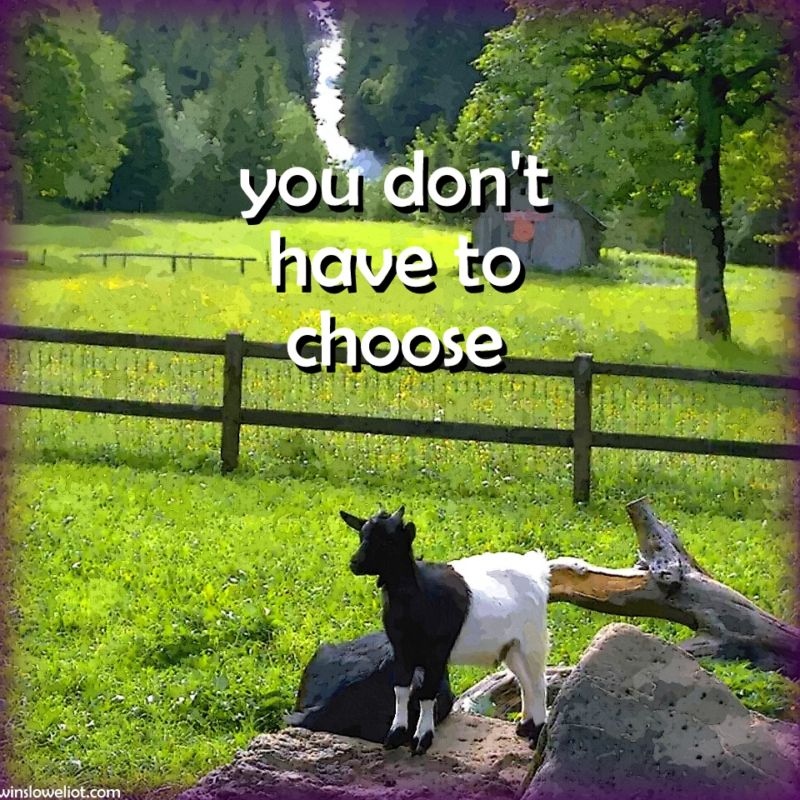
Stillness 12-8: I sometimes think people expend too much effort on thinking they have to make smart choices. Media, merchandise, and our own insecurities feed our sense that there’s a right or wrong choice we can make—in something as small as buying the “right” present or as big as choosing a mate or a career.
In the height of a (thankfully long ago) deeply strugglish time for me, the process of choosing something as simple as a vegetable for dinner became almost paralyzing. I would go back and forth between the produce aisles. I would ask my young children or a stranger in the store for assistance. Eventually, calming that anxiety came from a surprising source: using a pendulum. Instead of going into a tizzy about trying to decide something, I’d surreptitiously take out my pendulum and let its energy tell me what to do. Spinach or broccoli? Red leaf or green leaf lettuce? Within a few weeks, I was cured of my near-paralysis because I learned something vital: it doesn’t matter what you choose.
The choices we make aren’t nearly as important as what we do with them. When I was freed of the paralytic and annoying pressure of making the “right” choice, my imagination was free to roam into delicious recipes or lively stories about the vegetable I could tell my family, or just be at peace and let nourishment take its own place at the table, without my having to force it or make it happen.
People think the choices we make are crucial in forming our lives. If only I’d taken that job! If I’d married that person instead of the other! If only I’d had children. Should I move to Athens or Bali? Live in the town or the country? Travel by land or by sea? We think what we choose now might influence the rest of our lives.
But that’s not really how it happens. I think we can trust our destiny and soul’s longing to guide us. Whether it’s a mate we’ve agreed to live with (for a few years or a lifetime) or work (short-term or long-term) that will fulfill our life’s purpose, these apparent choices don’t change who we are. They might change how we are—but not who we are. We are more like trees with many branches than we are like two roads diverging in a yellow wood. Whether we live in Bali or Athens isn’t going to make a difference with regard to the becoming of our “self”—our individuating process, as Carl Jung calls it. We become the choices we make—they aren’t static roads we walk along.
So instead of worrying about choosing, let’s imagine, create, and build. We can’t make wrong or bad choices, just as it’s unhelpful to regret red leaf over green leaf. The point is to appreciate it, dress it, value it, learn about it. That’s what life is.
When I’m feeling down, people tell me I can choose my state of feeling. Happiness, I’m told, is a choice. Sadly, that advice makes me feel even sadder, since sometimes I don’t feel I have the will or intelligence to pull myself out of an extreme gloom. Now I wonder: instead of thinking I should choose a different state of feeling, a process that sometimes seems hopelessly steep and tiring, maybe I’ll let the gloom be as interesting as the happiness. Maybe it’s not a bad thing to feel sad or nostalgic or frustrated. Maybe it’s just part of who I am, branches of the tree that keep growing out and out from my spirit into the sky and roots that spread deeper into our beautiful earth. Maybe sadness is not a wrong road but part of who I am.
And if the choice we’re facing seems bigger than lettuce or a pair of shoes, or even an emotion, maybe we could think about it as experience and wisdom. For instance, I don’t think we ever choose the “wrong” person to be friends with, much less to marry. There are no failures—sometimes there are endings and sometimes there are people you may need to extricate yourself from, like the vines of bittersweet twining around a hawthorn tree. Pruning is good, as is nourishing, planting, growing and being freed from. Today, let’s be more like trees—let’s become who we are.
